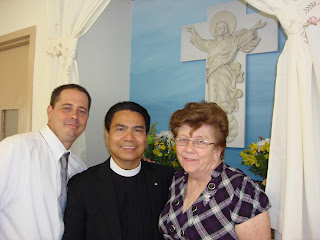POWER OF WORDS – Fred Vergara
Two cancer patients were given the same prognosis: “you have three months to live.” One negatively said, “Woe unto me, I may die soon!” He died after three weeks. The other one positively said, “I will survive and live forever.” He survived and has been in remission.
Words have power and we must be careful with our words. The words we speak, especially coming from our heart, can mean either life or death. Solomon, the wisest king of Israel said, “Death and life are in the power of the tongue” (Proverbs 18:21).
When I was a student chaplain, I often visited pre-ops patient and would teach them how to say positive words prior to surgery. I believe that the desire, the will and the words of the patient have a lot to do with the success of the surgery just as much as the skill of the surgeon. If the patient confesses death, then death-consciousness will begin to work in his system. If he confesses life, the body begins to release the natural forces of healing to make his desire or prayer come true.
This is also true among the elderly who have retired from work. When the mind begins to think of itself as old and confesses, “I’m retired now; I am too old to do anything productive,” then the body will respond to these words and rapid aging would take place. The mind begins to lose memory, the body becomes inactive, the bones atrophy. On the other hand, if one says, “my experiences give me more wisdom and I am learning more about life now that I've never known before,” then youthful enthusiasm kicks in, youthful energy is ignited and youthful aging gracefully moves.
Age is more than chronology, it is a state of the mind and is influenced by the things we think and the words we say. That is why we find many active and strong elderly people in church. Church activities make them young. Singing and making melody to the Lord make them remember. Serving, sharing, being hospitable to others make them active. Teaching and learning new things make them alive. Talking with both young and old make them happy. A merry heart doeth good like a medicine. A broken spirit drieth the bones but a merry tongue from the merry heart is the joy of the Lord!
One other thing that positive words can change is poverty. I have lived, studied and traveled far and wide to know that poverty is not of God. I believe poverty is a curse of the devil and those who create and operate systems that perpetuate poverty are of the devil. I would not mention the countries, but I have seen many who suffer in abject poverty, struggling to survive just one more day. As a youth activist in the 1970’s, I had seen and experienced slum dwellers near the garbage “smoky mountain” who ate under the mosquito nets because the flies are swarming around the dining area. Oppressive poverty where people are chained in misery and hopelessness is demonic. God desires to deliver His people from the curses of sin, poverty, disease and death. His Son, Jesus Christ came to give us life and have it more abundantly (John 10:10).
As individuals, changing our self-image is one of the keys to deliverance from poverty. If we create a self-image of being poor, then we will always be poor and in need of other people’s hand-outs. On the other hand, if we create a self-image of being wealthy, then we attract the forces of prosperity. By confessing strength, the weak becomes strong; by confessing wealth, the poor becomes rich. The road to health, wealth and joy begins from the spirit and the mind. By trusting God and working hard to reach your dream, you will be able to lift yourself up from the quagmire of poverty and move into a place where you can share the bounties of the earth---and give enough for the Lord’s work.
Speaking creative and positive words started with God who from darkness said, “let there be light”--- and there was light. Creatio ex nihilo. God created something from nothing. The Bible says that the world, as we know it, was framed by the word of God, so that the things which are seen were not made of things which are visible. It is another way of saying that the universe came into existence by creative divine words.
Of course, we are not God to create something from nothing. But no matter who you are and where you are, you have at least “some” thing. There is not one person who has nothing. You have at least one thing or two things to start with. All you need is faith: believe in God, believe in yourself and speak your faith. Jesus said that if you have faith even as small as a mustard seed you can say to the mulberry tree, be uprooted and thrown into the sea, and it will happen (.Luke 17:6). In modern parlance, if you have faith like a microchip, you can fly me to the moon. “Faith is being sure of what we hope for, the confessing of things we dream of” (Hebrews 11).
The principle of faith operates in the words we speak. So instead of whining and complaining, which are depressive to the spirit, soul and body, why not confess positive, creative and inspiring words? Proverbs 25:11 says, “Words aptly spoken are like apples of gold in a setting of silver.” So begin by aptly saying to yourself, “I am strong; I am healthy; I am wealthy; I am beautiful. I am smart; I can do all things through Christ who strengthens me.” Then like Mary, end by saying, ‘Lord, let it be done to me, according to Thy Word.”














